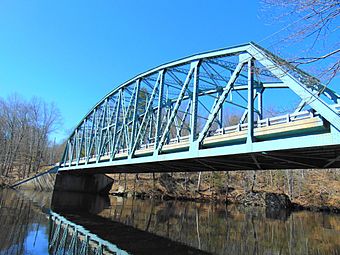Butts Bridge facts for kids
Quick facts for kids |
|
|
Butts Bridge
|
|

Butts Bridge
|
|
| Location | Butts Bridge Road over Quinebaug R., Canterbury, Connecticut |
|---|---|
| Area | 0.2 acres (0.081 ha) |
| Built | 1936 |
| Architect | Connecticut State Highway Dept. |
| Architectural style | Parker through truss |
| NRHP reference No. | 10000272 |
| Added to NRHP | May 24, 2010 |
The Butts Bridge is a special bridge in Canterbury, Connecticut. It carries Butts Bridge Road, also known as Connecticut Route 668, over the Quinebaug River. This bridge is a great example of a type called a Parker truss bridge.
It was built in 1937. This was a bit later than when most steel truss bridges were usually built in Connecticut. The bridge is also called Bridge No. 1649. About 2,300 cars drive over it every day. Because it is so important and well-preserved, it was added to the National Register of Historic Places in 2010.
Contents
What is Butts Bridge?
The Butts Bridge is found in a quiet, countryside part of southeastern Canterbury. It stretches across the Quinebaug River, generally running from east to west.
How the Bridge Looks
This bridge is a single-span steel Parker truss design. This design was very common for bridges built when cars first became popular. The bridge is about 231 feet (70 meters) long. The main parts of the bridge, called the trusses, are 31 feet (9.4 meters) apart. These trusses sit on strong concrete supports called abutments. The road itself is made of concrete.
A Look Back in Time: The Bridge's History
The Butts Bridge is at least the fourth bridge to stand in this area. This spot has been part of a road connecting Norwich and Plainfield since colonial times. Older bridges, made of wood or wrought iron, were likely located a bit further downstream. However, their exact locations are not known today.
The bridge that was here before this one was just upstream. You can still see parts of its old supports. The current Butts Bridge was finished in 1937. It was built by a company called Fort Pitt Bridge Works. The plans for the bridge came from the Connecticut State Highway Department. The bridge was built as part of a big help program after a major flood in 1936. This flood caused a lot of damage, and new bridges were needed to help communities recover.
Gallery
-
Quinebaug River from Butts Bridge
 | William Lucy |
 | Charles Hayes |
 | Cleveland Robinson |





